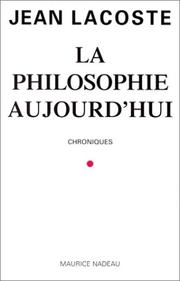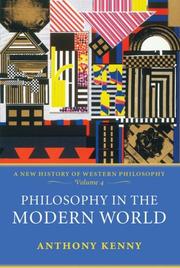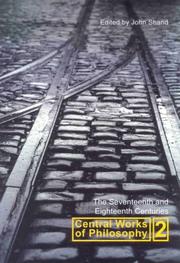| Listing 1 - 10 of 2031 | << page >> |
Sort by
|
Book
ISBN: 3518281704 Year: 1985 Publisher: Frankfurt am Main Suhrkamp
Abstract | Keywords | Export | Availability | Bookmark
 Loading...
Loading...Choose an application
- Reference Manager
- EndNote
- RefWorks (Direct export to RefWorks)

ISBN: 286231143X 9782862311432 Year: 1997 Publisher: Paris: Nadeau,
Abstract | Keywords | Export | Availability | Bookmark
 Loading...
Loading...Choose an application
- Reference Manager
- EndNote
- RefWorks (Direct export to RefWorks)

ISBN: 1281160474 0191524999 1429492732 9780191524998 0198752792 9780198752790 9780199546374 0199546371 9786611160470 6611160477 9781429492737 9781281160478 1383032750 Year: 2007 Publisher: Oxford New York Clarendon Press Oxford University Press
Abstract | Keywords | Export | Availability | Bookmark
 Loading...
Loading...Choose an application
- Reference Manager
- EndNote
- RefWorks (Direct export to RefWorks)
Anthony Kenny tells the story of the development of philosophy from the early 19th to the late 20th century. He introduces the ideas of such extraordinary thinkers as Schopenhauer, Kierkegaard, Marx, Freud, Heidegger and Sartre.
Book
ISBN: 3111370348 9783111370347 3111013367 Year: 2012 Publisher: [Berlin] De Gruyter
Abstract | Keywords | Export | Availability | Bookmark
 Loading...
Loading...Choose an application
- Reference Manager
- EndNote
- RefWorks (Direct export to RefWorks)
Die Philosophie Im Ersten Drittel Des 19. Jahrhunderts (Sammlung G Schen)
Book
ISBN: 9004269347 9789004269347 9789004254961 900425496X Year: 2014 Publisher: Leiden, Netherlands
Abstract | Keywords | Export | Availability | Bookmark
 Loading...
Loading...Choose an application
- Reference Manager
- EndNote
- RefWorks (Direct export to RefWorks)
This volume, edited by Tiziana Andina, tackles some of the most compelling questions addressed in contemporary philosophy. Covering areas so diverse as metaphysics, ethics, philosophy of language, philosophy of science, political philosophy, philosophy of art, epistemology and philosophy of mind, this book maps the past fifty years of philosophical reflection, Bridging the Analytical Continental Divide . Not only will the reader get to know philosophy’s most interesting and promising developments, but she will also be immersed in human thought in a broader sense, as the book explores both our ability to explore the world and ask questions and our capability to organize societies, create art and give humankind an ethical and a political dimension. Contributors include: Tiziana Andina, Annalisa Amoretti, Luca Angelone, Alessandro Arbo, Carola Barbero, Andrea Borghini, Francesco Berto, Chiara Cappelletto, Stefano Caputo, Elena Casetta, Annalisa Coliva, Francesca De Vecchi, Maurizio Ferraris, Valeria Ottonelli, Andrea Pedeferri, Daniela Tagliafico, Italo Testa, Giuliano Torrengo, Vera Tripodi.
Book
ISBN: 0191634522 9780191634529 9780191745218 0191745219 9780199659593 0199659591 0199659605 9780199659609 Year: 2012 Publisher: Oxford Oxford University Press
Abstract | Keywords | Export | Availability | Bookmark
 Loading...
Loading...Choose an application
- Reference Manager
- EndNote
- RefWorks (Direct export to RefWorks)
Oxford Studies in Early Modern Philosophy presents a selection of the best current work in the history of early modern philosophy. It focuses on the seventeenth and eighteenth centuries--the extraordinary period of intellectual flourishing that begins, very roughly, with Descartes and his contemporaries and ends with Kant.
Book
ISBN: 162273050X 9781622730506 1622730224 9781622730223 Year: 2015 Publisher: Wilmington, Delaware Vernon Press
Abstract | Keywords | Export | Availability | Bookmark
 Loading...
Loading...Choose an application
- Reference Manager
- EndNote
- RefWorks (Direct export to RefWorks)
Perhaps we are never done with thought, nor should be. If this is indeed the case, then Kant may have been right after all in supposing that folks will never lose interest in metaphysics, in thought thinking thought. But what of academics? Where would we find these days a comprehensive treatment of pure reason, of the epochs of its origins and accomplishments, that is not just another collection of interpretations of "source" texts in translation?This study introduces philosophy students and professionals to the "logotectonic" method of conception as developed by Heribert Boeder, a pupil of Ma
Book
ISBN: 1315712245 1317494369 1282921606 9786612921605 1844653609 9781317494362 9781315712246 9781844650163 9781844650170 9781317494348 9781317494355 1317494350 Year: 2014 Publisher: Abingdon, Oxon New York
Abstract | Keywords | Export | Availability | Bookmark
 Loading...
Loading...Choose an application
- Reference Manager
- EndNote
- RefWorks (Direct export to RefWorks)
CENTRAL WORKS OF PHILOSOPHY is a multi-volume set of essays on the core texts of the western philosophical tradition. From Plato's Republic to the present day, the volumes range over 2,500 years of philosophical writing covering the best, most representative, and most influential work of some of our greatest philosophers. Each essay has been specially commissioned and provides an overview of the work and clear and authoritative exposition of its central ideas. Volume 3 explores some of the most important philosophical works of the nineteenth century. The volume begins with Kant's magnum opus, Critique of Pure Reason, which in arguing for transcendental idealism began one of the most significant and turbulent periods of philosophical activity in modern times and determined much of the course of nineteenth-century philosophy. Following on from Kant's Critique, the volume examines two central texts of the post-Kantian idealists, Fichte's Science of Knowledge, and Hegel's monumental Phenomenology of Spirit. The volume includes chapters on Schopenhauer's masterpiece The World as Will and Representation, which hoped to rectify deficiencies in Kant's philosophy, and a major philosophical text by Kierkegaard, the Philosophical Fragments. Marx's Capital, one of the most influential books of the modern age, and Nietzsche's On the Genealogy of Morals, his most philosophically systematic and accessible work on ethics, are also examined. In addition the moral and political philosophy of John Stuart Mill, perhaps the only philosopher in this volume to evade Kant's influence, is discussed in a chapter on his classic essay On Liberty.

ISBN: 1317494385 1315712253 1317494393 1282921592 9786612921599 1844653595 9781844653591 9781317494393 9781844650149 1844650146 1844650154 9781844650156 Year: 2005 Publisher: Chesham [U.K.] Acumen
Abstract | Keywords | Export | Availability | Bookmark
 Loading...
Loading...Choose an application
- Reference Manager
- EndNote
- RefWorks (Direct export to RefWorks)
CENTRAL WORKS OF PHILOSOPHY is a multi-volume set of essays on the core texts of the western philosophical tradition. From Plato's Republic to the present day, the volumes range over 2,500 years of philosophical writing covering the best, most representative, and most influential work of some of our greatest philosophers. Each essay has been specially commissioned and provides an overview of the work and clear and authoritative exposition of its central ideas. Volume 2 examines the brilliant outpouring of philosophical thought that characterised the seventeenth and eighteenth centuries and which gave rise to the influential traditions of rationalism and empiricism. The book begins with Descartes's Meditations on First Philosophy, which for the first time put forward the view that knowledge of the world is obtained through pure reason alone and in so doing marked the start of the modern period in the history of philosophy. The volume then examines two further texts in the rationalist tradition: Spinoza's Ethics, which builds Descartes's concepts into a consistent metaphysical theory with ethical consequences, and Leibniz's The Monadology, which explores what must be the ultimate nature of reality if the world is to be fully explained. Three landmark works of empiricist philosophy are considered: Locke's An Essay Concerning Human Understanding, which argues that we must make knowledge ours through experience and not authority; Berkeley's attack on materialism in his A Treatise Concerning the Principles of Human Knowledge and Hume's search for rational justification for our most basic beliefs about the world in his A Treatise of Human Nature. In addition, the book also includes chapters on two of the seminal works of moral and political philosophy of the period: Hobbes's masterpiece, Leviathan, which reminds us of the dangers of the unchecked brutality of human nature, and Rousseau's The Social Contract, a vision of how human nature may be changed for the better in a new society.
Book
ISBN: 0300224915 9780300224917 0300208537 9780300208535 Year: 2016 Publisher: New Haven London
Abstract | Keywords | Export | Availability | Bookmark
 Loading...
Loading...Choose an application
- Reference Manager
- EndNote
- RefWorks (Direct export to RefWorks)
In this passionate and searching book, Anthony Kronman offers a third way-beyond atheism and religion-to the God of the modern world "An astonishing, . . . epically ambitious book. . . . An intellectual adventure story based on the notion that ideas drive history, and that to dedicate yourself to them is to live a bigger, more intense life."-David Brooks, New York Times We live in an age of disenchantment. The number of self-professed "atheists" continues to grow. Yet many still feel an intense spiritual longing for a connection to what Aristotle called the "eternal and divine." For those who do, but demand a God that is compatible with their modern ideals, a new theology is required. This is what Anthony Kronman offers here, in a book that leads its readers away from the inscrutable Creator of the Abrahamic religions toward a God whose inexhaustible and everlasting presence is that of the world itself. Kronman defends an ancient conception of God, deepened and transformed by Christian belief-the born-again paganism on which modern science, art, and politics all vitally depend. Brilliantly surveying centuries of Western thought-from Plato to Augustine, Aquinas, and Kant, from Spinoza to Nietzsche, Darwin, and Freud-Kronman recovers and reclaims the God we need today.
| Listing 1 - 10 of 2031 | << page >> |
Sort by
|

 Search
Search Feedback
Feedback About UniCat
About UniCat  Help
Help News
News